Letter Of Intent And Interest For Internship
Dear [Recipient's Name],
I am writing to express my strong interest in applying for an internship position within [Company/Organization Name]. As a highly motivated and dedicated student, I believe that the [Company/Organization Name] internship program would provide me with invaluable experience and the opportunity to contribute to the work of your esteemed organization.
Currently, I am pursuing [mention your degree or program] at [University/Institution Name], where I have developed a solid foundation in [mention relevant coursework or skills]. I am particularly passionate about [mention your area of interest or specialization], and I am eager to gain practical experience in this field. The exceptional reputation of [Company/Organization Name] for [mention a specific project, research, or accomplishment] has inspired me to seek an internship within your organization.
During my academic journey, I have actively engaged in various extracurricular activities and leadership roles, which have honed my communication, teamwork, and problem-solving skills. I have also had the opportunity to apply my knowledge in practical settings through [mention relevant experiences or projects]. These experiences have not only strengthened my technical abilities but also instilled in me a strong work ethic and a drive for excellence.
I am particularly drawn to [Company/Organization Name] due to its commitment to [mention a specific aspect or value of the organization]. The opportunity to work alongside talented professionals and contribute to [Company/Organization Name]'s mission would be a tremendous honor. I am confident that my dedication, enthusiasm, and willingness to learn would make me a valuable asset to your team.
I have enclosed my resume for your review, which provides further details about my academic background, relevant coursework, and experiences. Additionally, I would be delighted to discuss my qualifications in person through an interview or provide any additional documents or references at your request.
Thank you for considering my application. I am eager to contribute to [Company/Organization Name] and to learn from the talented individuals within your organization. I look forward to the opportunity to discuss how my skills and experiences align with your internship program.
Please feel free to contact me at [Phone Number] or [Email Address] at your convenience. Thank you for your time and consideration.
Sincerely,
[Your Name]
Standard Professional Internship Letter of Intent
Subject: Letter of Intent for [Internship Position Title] at [Company Name]
Dear [Hiring Manager's Name/Internship Coordinator],
I am writing to express my strong interest in the [specific internship position] at [Company Name] for [semester/summer/dates]. As a [year] student majoring in [your major] at [University Name], I am eager to apply my academic knowledge and develop practical skills in a professional environment.
Through my coursework in [relevant courses], I have developed a solid foundation in [relevant skills/knowledge areas]. I am particularly drawn to [Company Name] because of [specific reasons: company values, projects, reputation, innovation, etc.]. Your organization's work in [specific area] aligns perfectly with my career aspirations in [field/industry].
During my academic career, I have [mention relevant projects, achievements, or experiences]. These experiences have prepared me to contribute meaningfully to your team while learning from industry professionals. I am especially interested in [specific aspect of the internship or department] and believe this opportunity would be invaluable for my professional development.
I am confident that my [list 2-3 key qualities: analytical skills, teamwork abilities, technical proficiency, etc.] combined with my enthusiasm and willingness to learn make me an excellent candidate for this position. I am available to start on [date] and can commit to [duration/hours per week].
I have attached my resume, transcripts, and letters of recommendation for your review. I would welcome the opportunity to discuss how my background and goals align with the internship program. Thank you for considering my application.
Sincerely,
[Your Full Name]
[Phone Number]
[Email Address]
[LinkedIn Profile]
Career Change/Career Pivot Internship Letter
Subject: Letter of Intent - Career Transition Internship Opportunity
Dear [Hiring Manager's Name],
I am writing to express my genuine interest in pursuing an internship with [Company Name] as I transition into the [new field/industry] sector. While my professional background has been in [previous field], I am committed to redirecting my career path toward [new field], and I believe an internship with your organization would provide the essential foundation for this transition.
Over the past [timeframe], I have been actively preparing for this career change through [coursework, certifications, self-study, workshops, volunteer work]. My previous experience in [old field] has equipped me with valuable transferable skills including [list relevant skills: project management, communication, problem-solving, etc.]. I am confident these competencies, combined with my fresh perspective and mature work ethic, will allow me to contribute meaningfully to your team.
What attracts me most to [Company Name] is [specific reasons]. I have thoroughly researched your organization's mission, recent projects, and company culture, and I am inspired by [specific aspect]. I am particularly interested in learning about [specific areas or departments] and contributing to [specific goals or projects].
I understand that career changers bring a unique value proposition. My years of professional experience have taught me how to learn quickly, adapt to new environments, manage time effectively, and work collaboratively. I am not just seeking to gain skills but to bring dedication, maturity, and a proven track record of professional achievement to this internship role.
I am available for [full-time/part-time] commitment starting [date] and am flexible with the duration based on your program structure. I would be grateful for the opportunity to discuss how my background and enthusiasm can benefit your team.
Thank you for considering my application during this pivotal moment in my career journey.
Warm regards,
[Your Name]
[Contact Information]
Speculative/Unsolicited Internship Inquiry Letter
Subject: Inquiry Regarding Potential Internship Opportunities
Dear [Department Head/HR Manager],
I hope this message finds you well. Although I have not seen a posted internship opportunity, I am reaching out to inquire whether [Company Name] might consider creating an internship position for a motivated [year] student passionate about [field/industry].
I have been following [Company Name]'s work in [specific area] with great admiration, particularly [mention specific projects, achievements, or initiatives]. As someone deeply interested in [field], I believe that an internship with your organization would provide unparalleled learning opportunities while allowing me to contribute fresh ideas and dedicated effort to your team.
Currently, I am pursuing [degree] at [University], with a concentration in [specific area]. My academic work has included [relevant coursework and projects], and I have developed skills in [list relevant skills]. I am particularly interested in [specific aspect of company's work] and have been working independently on [related project or research] to deepen my understanding.
I understand that your organization may not have a formal internship program or current openings, but I wanted to express my strong interest in exploring any possibilities. I am flexible regarding the internship structure, duration, and even compensation. My primary goal is to gain hands-on experience and learn from the talented professionals at [Company Name].
Would it be possible to schedule a brief conversation to discuss whether there might be opportunities for me to contribute to your team? I am happy to work around your schedule and can provide additional information about my background and interests.
Thank you for taking the time to consider my inquiry. I look forward to the possibility of connecting with you.
Best regards,
[Your Name]
[Contact Information]
[Portfolio/Website if applicable]
Follow-Up Letter of Continued Interest After Interview
Subject: Thank You and Continued Interest in [Internship Position]
Dear [Interviewer's Name],
Thank you for taking the time to speak with me on [date] about the [internship position] at [Company Name]. I truly enjoyed our conversation about [specific topics discussed], and learning more about [specific projects or aspects of the role] has only strengthened my enthusiasm for this opportunity.
After our discussion, I am even more convinced that this internship aligns perfectly with my career goals and interests. I was particularly excited to hear about [specific project, team structure, or company initiative mentioned in interview], as this directly relates to my experience with [relevant experience or coursework]. I have been reflecting on our conversation about [specific challenge or topic], and I believe my background in [relevant area] would allow me to contribute effectively to [specific goal or project].
Since our interview, I have [mention any relevant actions taken: researched something discussed, completed a relevant project, gained new relevant experience]. This has further prepared me to hit the ground running and make meaningful contributions to your team from day one.
I want to reiterate my strong interest in this position and my eagerness to join [Company Name]. The culture of [specific cultural aspect] and the opportunity to work alongside [team/department] would provide the ideal environment for my professional growth. I am confident that I can bring [specific skills or qualities] to support your team's objectives.
Please let me know if you need any additional information from me. I remain very interested in this opportunity and look forward to hearing about the next steps in your selection process.
Thank you again for your time and consideration.
Sincerely,
[Your Name]
[Contact Information]
Research/Academic Internship Letter of Intent
Subject: Application for Research Internship in [Specific Research Area]
Dear Professor/Dr. [Name],
I am writing to express my strong interest in joining your research group as an intern to work on [specific research project or area]. As a [year] student majoring in [major] at [University], I have developed a keen interest in [research area], and I am eager to contribute to cutting-edge research while developing my skills as a researcher.
My interest in your work stems from [specific reason: reading your papers, attending a lecture, learning about specific project]. I was particularly fascinated by your recent publication on [specific paper or topic], especially [specific aspect]. Your research approach to [methodology or focus] aligns closely with my academic interests and career aspirations in [field].
Through my coursework in [relevant courses], I have gained experience with [research methods, techniques, or tools]. Additionally, I have [completed relevant projects, participated in research, or developed relevant skills]. I am proficient in [specific software, programming languages, laboratory techniques, or analytical methods] and am eager to expand my technical capabilities through hands-on research experience.
I am particularly interested in contributing to [specific project or research question] and would welcome the opportunity to assist with [specific tasks: data collection, analysis, literature review, experimental procedures]. I understand that research requires patience, precision, and critical thinking, and I am committed to maintaining the highest standards of scientific rigor.
I am available to work [number] hours per week starting [date] for a duration of [timeframe]. I am also open to discussing how my involvement could align with your group's current needs and priorities. I have attached my CV, transcripts, and a writing sample demonstrating my analytical abilities.
Thank you for considering my application. I would be honored to contribute to your research program and learn from your expertise.
Respectfully,
[Your Name]
[Contact Information]
International Student Internship Letter with Visa Considerations
Subject: Letter of Intent for [Internship Position] - International Student Applicant
Dear [Hiring Manager's Name],
I am writing to express my enthusiastic interest in the [internship position] at [Company Name]. As an international student currently pursuing [degree] at [University], I am excited about the opportunity to gain practical experience in [field/industry] while contributing my unique perspective and skills to your organization.
I am particularly drawn to [Company Name] because of [specific reasons]. Your company's commitment to [specific value or initiative] resonates with my professional values, and I am eager to learn from your team's expertise in [specific area]. Through my academic work in [relevant courses], I have developed strong competencies in [relevant skills], and I am ready to apply this knowledge in a professional setting.
As an international student on an F-1 visa, I am authorized to work through [CPT - Curricular Practical Training / OPT - Optional Practical Training / other authorization]. I have already confirmed with my university's international student office that this internship would qualify for work authorization, and I am prepared to complete all necessary paperwork promptly. [For CPT: This internship is a required/integral part of my curriculum] [For OPT: I have/will have completed my degree by the start date].
I want to assure you that all visa and work authorization processes will be handled efficiently, and I am happy to work closely with your HR department to ensure full compliance with all regulations. The authorization process typically takes [timeframe], and I have already begun preparing the necessary documentation.
My international background has equipped me with [cross-cultural communication skills, multilingual abilities, global perspective, adaptability]. I am fluent in [languages] and have experience working in diverse, multicultural environments. I believe these qualities, combined with my technical skills and academic preparation, make me a strong candidate for this position.
I have attached my resume, transcripts, and documentation regarding my work authorization status. I would welcome the opportunity to discuss how I can contribute to your team and address any questions about the work authorization process.
Thank you for your consideration.
Sincerely,
[Your Name]
[Contact Information]
[Current Visa Status]
Casual/Creative Industry Internship Letter
Subject: Let's Create Something Amazing Together - Internship Interest
Hey [First Name],
I hope this email finds you in the middle of something creative and inspiring! I'm reaching out because I'm genuinely excited about the possibility of interning with [Company Name], and I wanted to share why I think we'd be a great fit.
I've been following your work for a while now, and honestly, I'm a huge fan. [Specific project or campaign] completely blew me away – the way you [specific creative element] was exactly the kind of bold, innovative thinking I want to be part of. As someone who's passionate about [creative field], I'm constantly looking for opportunities to learn from the best, and your team is definitely at the top of that list.
Right now, I'm a [year] at [University] studying [major], but let's be real – some of my best learning has happened outside the classroom. I've been [freelancing/working on personal projects/building my portfolio] in [specific area], and I've picked up skills in [relevant tools and techniques]. I'm not claiming to know everything (who does?), but I'm scrappy, I learn fast, and I'm not afraid to try unconventional approaches.
What excites me most about this internship is [specific aspect]. I'd love to contribute to [specific type of projects] and soak up knowledge from your team. I'm especially interested in [specific area or technique], and I think my background in [relevant experience] could bring a fresh perspective to your projects.
I've attached my portfolio and resume so you can check out some of my work. Fair warning: I'm still growing as a creative professional, but I think my projects show my potential and my willingness to push boundaries.
Would you be open to chatting sometime? I'd love to hear more about what you're working on and explore how I might fit into the picture. I'm flexible, eager, and ready to jump in whenever works for your team.
Thanks for taking the time to read this. Looking forward to hopefully creating something awesome together!
Cheers,
[Your Name]
[Phone]
[Email]
[Portfolio Link]
[Instagram/Behance/Dribbble]
Virtual/Remote Internship Letter of Intent
Subject: Application for Remote Internship Position
Dear [Hiring Manager's Name],
I am writing to express my interest in the remote internship opportunity for [position title] at [Company Name]. As someone who thrives in virtual work environments and possesses strong self-management skills, I am excited about the prospect of contributing to your team from [your location].
The remote nature of this internship is particularly appealing to me, as I have [previous remote work/study experience] and have developed effective strategies for staying productive, communicating clearly, and collaborating across digital platforms. I am well-equipped with [list technology: reliable internet, necessary software, dedicated workspace] and am comfortable working across different time zones if needed.
My background in [field/major] has prepared me well for this role. I have experience with [relevant skills and tools], and I am proficient in remote collaboration tools including [Slack, Zoom, Asana, Trello, Microsoft Teams, etc.]. During [previous remote experience], I successfully [specific achievement or responsibility], which demonstrated my ability to deliver quality work without in-person supervision.
I am particularly drawn to [Company Name] because [specific reasons]. Your company's approach to [specific aspect] aligns with my professional interests, and I am eager to contribute to [specific projects or goals]. Working remotely will not diminish my commitment or engagement – in fact, I believe it will allow me to bring focused energy and flexibility to the role.
Understanding the unique challenges of remote internships, I want to emphasize my communication skills and proactive approach. I believe in over-communicating rather than under-communicating, maintaining regular check-ins, and being responsive during agreed-upon working hours. I am also comfortable with asynchronous work and can document my progress effectively.
I am available to work [hours per week] starting [date] and am flexible with scheduling to accommodate team meetings and collaboration sessions. I have attached my resume and portfolio demonstrating my remote work capabilities and relevant projects.
Thank you for considering my application. I look forward to discussing how I can contribute to your team in a virtual capacity.
Best regards,
[Your Name]
[Contact Information]
[Time Zone]
What is a Letter of Intent and Interest for an Internship and Why Do You Need It
A Letter of Intent and Interest for an Internship is a formal document that communicates your desire to secure an internship position with a specific organization. Unlike a standard cover letter that responds to a posted job opening, this letter proactively expresses your enthusiasm for gaining practical experience, learning from professionals, and contributing to an organization's mission.
Primary purposes include:
- Demonstrating genuine interest in a specific company or research group
- Articulating how an internship aligns with your career goals and academic pursuits
- Showcasing your relevant skills, knowledge, and potential value to the organization
- Initiating a professional relationship that may lead to an internship opportunity
- Standing out from other candidates through personalized, thoughtful communication
- Expressing commitment to professional development and learning
- Creating opportunities even when no formal internship postings exist
When Should You Send a Letter of Intent for an Internship
Academic timing scenarios:
- 3-6 months before your desired internship start date for competitive programs
- At the beginning of internship recruiting season (typically fall for summer internships)
- After attending a career fair where you connected with company representatives
- When you discover an organization whose mission resonates with your career goals
- After completing relevant coursework that qualifies you for specific opportunities
Application-related timing:
- Immediately after learning about an unadvertised internship opportunity
- When reaching out to companies without formal internship programs
- Following an informational interview that sparked your interest
- After a company presentation or campus recruitment event
- When you receive an interview invitation and want to reaffirm interest
Follow-up scenarios:
- After submitting a formal application to reiterate enthusiasm
- Following an interview to maintain momentum in the selection process
- When the application deadline has passed but you want to be considered for future opportunities
- After networking events where you met potential supervisors or mentors
- When you have gained new relevant experience since your initial application
Who Should Send an Internship Letter of Intent
Student categories:
- Undergraduate students seeking practical experience in their field of study
- Graduate students pursuing specialized research or industry experience
- Recent graduates looking to gain additional skills before entering the job market
- Community college students preparing to transfer to four-year institutions
- High school students seeking early exposure to professional environments
Career transition individuals:
- Professionals pivoting to new industries who need updated practical experience
- Career changers who want to validate their interest in a new field
- Parents returning to the workforce after an extended absence
- Military veterans transitioning to civilian careers
- Individuals pursuing second careers after retirement from previous professions
Specialized situations:
- International students seeking work experience aligned with visa requirements
- Students with disabilities who want to proactively discuss accommodations
- Part-time students who need flexible internship arrangements
- Entrepreneurs seeking to learn from established companies before launching ventures
- Artists and creatives building portfolios through structured internship experiences
To Whom Should You Address Your Internship Letter of Intent
Primary recipients:
- Internship coordinators or program managers specifically designated for intern recruitment
- Department heads or team leaders in your area of interest
- Human resources professionals who oversee entry-level talent acquisition
- University career services coordinators who have connections with the organization
- Alumni from your institution who work at the target company
Research and academic settings:
- Principal investigators leading research projects relevant to your interests
- Laboratory managers or research coordinators who handle day-to-day operations
- Graduate students or postdocs who may have influence over intern selection
- Department chairs who can direct you to appropriate opportunities
- Research administrators who manage funding and personnel decisions
For unsolicited inquiries:
- CEOs or founders of small companies or startups where direct contact is appropriate
- Directors of specific departments that align with your skills and interests
- Professionals you've connected with through networking events or LinkedIn
- Contacts provided through your university's alumni network
- Mentors or advisors who can forward your letter to appropriate decision-makers
How to Write an Effective Internship Letter of Intent
Research and preparation process:
- Thoroughly investigate the company's mission, values, recent projects, and culture
- Identify specific departments, projects, or initiatives that align with your interests
- Review the organization's social media, press releases, and industry news
- Connect with current or former interns to gain insider perspectives
- Understand the organization's challenges and consider how you might contribute
Writing strategy:
- Open with a compelling statement that immediately captures attention
- Clearly articulate why you're interested in this specific organization (not just any internship)
- Connect your academic background and experiences directly to the internship opportunity
- Demonstrate knowledge of the organization's work and show genuine enthusiasm
- Balance confidence with humility – show potential while acknowledging room for growth
- Use specific examples rather than generic statements about your abilities
Structural approach:
- Begin with a strong subject line that clearly states your purpose
- Use a professional yet warm greeting that addresses the recipient by name when possible
- Structure your letter in concise paragraphs that each serve a specific purpose
- Include a call to action that invites further conversation or next steps
- Close with appreciation for the reader's time and consideration
- Provide complete contact information and relevant links (portfolio, LinkedIn)
Requirements and Prerequisites Before Sending Your Letter
Documentation you should have ready:
- Updated resume tailored to the internship position and industry
- Academic transcripts showing relevant coursework and GPA if required
- Portfolio showcasing projects, writing samples, or creative work as applicable
- Letters of recommendation from professors, previous employers, or mentors
- List of relevant skills and certifications that support your candidacy
Eligibility considerations:
- Confirmation that you meet any academic standing requirements (minimum GPA, year in school)
- Understanding of work authorization status, especially for international students
- Verification that internship timing aligns with your academic schedule
- Clarification of whether the internship is for credit, paid, or volunteer
- Assessment of whether you can meet the time commitment and duration requirements
Preparation steps:
- Research whether the company has formal application procedures you should follow first
- Identify the appropriate contact person through LinkedIn, company website, or networking
- Prepare thoughtful questions to ask if you're offered a conversation
- Draft and revise your letter multiple times, seeking feedback from mentors or career counselors
- Customize your letter specifically for each organization rather than using a generic template
- Proofread meticulously for grammar, spelling, and formatting errors
Formatting Guidelines for Your Internship Letter
Length and structure specifications:
- Keep your letter to one page or 300-500 words maximum
- Use 3-5 concise paragraphs that each serve a distinct purpose
- Employ single spacing within paragraphs and double spacing between them
- Use standard business letter format with your contact information at the top
- Include a clear subject line that immediately conveys your purpose
Tone and language preferences:
- Adopt a professional yet enthusiastic tone that conveys genuine interest
- Use active voice and strong action verbs to describe your experiences
- Avoid overly casual language in formal settings, but don't be stiff or robotic
- For creative industries, feel free to inject personality while maintaining professionalism
- Eliminate clichés and generic phrases like "team player" or "passionate about excellence"
- Be specific rather than vague in all descriptions of your qualifications and interests
Technical formatting details:
- Use a professional font such as Arial, Calibri, or Times New Roman in 11-12 point size
- Maintain consistent formatting throughout including margins (1 inch on all sides)
- Send as a PDF to preserve formatting unless specifically requested otherwise
- Use a professional email address for contact information
- Include hyperlinks to your portfolio, LinkedIn, or relevant work samples
- Ensure your email subject line is clear and professional
What to Do After Sending Your Letter of Intent
Immediate follow-up actions:
- Send a brief thank-you email if you submitted your letter through a personal contact
- Save a copy of your letter and note the date sent for tracking purposes
- Set a calendar reminder to follow up if you haven't heard back within 2 weeks
- Continue researching the company and monitoring for any relevant news or developments
- Connect with the organization on LinkedIn if you haven't already
Timeline for follow-up communication:
- Wait 10-14 business days before sending a polite follow-up inquiry
- If you receive an acknowledgment but no decision, check in every 3-4 weeks
- Respect the timeline if the organization specifies when decisions will be made
- After one or two follow-ups without response, redirect your energy to other opportunities
- If you're offered an interview, respond within 24 hours to confirm your availability
Maintaining momentum:
- Continue applying to other internship opportunities to keep your options open
- Update your skills through online courses, projects, or volunteer work
- Network with professionals in your field to discover unadvertised opportunities
- Refine your letter based on any feedback or lack of response
- Stay positive and persistent – internship searches often take time and multiple attempts
- Keep detailed records of all applications, contacts, and responses for organization
Advantages and Disadvantages of Sending Internship Letters of Intent
Key advantages:
- Demonstrates proactive initiative and genuine interest beyond just submitting a resume
- Allows you to articulate your unique value proposition in your own words
- Creates opportunities at organizations without formal internship postings
- Shows you've done research and understand the organization's work
- Builds relationships with professionals who may remember you for future opportunities
- Differentiates you from candidates who only submit standard applications
Potential disadvantages:
- Time-intensive to customize properly for each organization
- May be ignored if sent to the wrong person or at the wrong time
- Can feel awkward if you lack significant relevant experience to highlight
- Risks coming across as presumptuous if not carefully worded
- May create disappointment if no response is received despite effort invested
- Could bypass important application procedures if not researched properly
Balancing considerations:
- Weigh the effort required against the desirability of the specific opportunity
- Consider whether a shorter expression of interest might be more appropriate
- Assess whether networking or informational interviews might be more effective first
- Recognize that rejection or non-response is normal and not a reflection of your worth
- Remember that even unsuccessful letters build your communication skills and confidence
Common Mistakes to Avoid in Your Internship Letter
Content and substance errors:
- Using a generic template without customization for the specific organization
- Focusing too much on what you want to gain rather than what you can contribute
- Including irrelevant information that doesn't support your candidacy
- Being vague about your interests instead of mentioning specific projects or departments
- Overstating your qualifications or making claims you cannot support
- Failing to explain why this particular organization interests you
Tone and style mistakes:
- Being too formal and stiff, making your letter sound robotic or impersonal
- Being too casual or familiar, especially when first contact with the organization
- Showing excessive desperation or neediness in your language
- Using humble-bragging or coming across as entitled
- Including humor that might be misunderstood or seem unprofessional
- Writing overly long sentences or paragraphs that lose the reader's attention
Technical and formatting errors:
- Spelling the recipient's name or company name incorrectly
- Including grammatical errors or typos that suggest carelessness
- Forgetting to update details when reusing a template (mentioning wrong company)
- Using an unprofessional email address or contact information
- Attaching the wrong documents or forgetting attachments altogether
- Sending at inappropriate times (late night, weekends for formal industries)
- Following up too aggressively or too frequently after sending
Comparing Letters of Intent with Other Application Materials
Letter of Intent vs. Cover Letter:
- Letters of intent are often unsolicited and exploratory, while cover letters respond to specific postings
- Intent letters focus more on future possibilities and organizational fit
- Cover letters typically address specific job requirements and qualifications
- Intent letters may be sent earlier in the recruitment cycle or outside formal processes
- Both require customization, but intent letters often demand more research and initiative
Letter of Intent vs. Statement of Purpose:
- Statements of purpose are typically for academic programs rather than internships
- Statements focus on research interests and academic goals in greater depth
- Intent letters are usually shorter and more immediately action-oriented
- Statements of purpose often discuss long-term career trajectories more extensively
- Both require demonstrating genuine interest and fit with the institution
Letter of Intent vs. Email Introduction:
- Email introductions are typically brief (3-5 sentences) informal inquiries
- Letters of intent are more comprehensive and formally structured
- Emails might request informational interviews, while intent letters express application interest
- Email introductions often precede letters of intent in networking situations
- Letters of intent are usually sent as attachments, while email introductions are in the body
Alternative approaches:
- Networking conversations followed by formal application when opportunities arise
- Direct applications through company portals without additional letters
- Working with university career services for warm introductions
- Attending company information sessions and following up afterward
- Engaging with company social media and building relationships before applying
Essential Elements and Structure of an Internship Letter of Intent
Opening components:
- Clear, specific subject line indicating purpose and position of interest
- Professional greeting addressing recipient by name when possible
- Strong opening sentence that captures attention and states your purpose
- Brief context explaining how you learned about the organization or opportunity
- Immediate indication of what internship period or duration you're seeking
Body content requirements:
- Specific explanation of why you're interested in this particular organization
- Connection between your academic background and the internship opportunity
- Concrete examples of relevant skills, projects, or experiences
- Demonstration of knowledge about the organization's work, values, or recent initiatives
- Clear articulation of what you hope to learn and contribute
- Evidence of research and genuine understanding of the role or field
Closing elements:
- Summary statement reiterating your interest and suitability
- Call to action inviting further conversation or next steps
- Expression of gratitude for the reader's time and consideration
- Complete contact information (phone, email, LinkedIn)
- Professional signature
- Mention of attached materials (resume, portfolio, transcripts)
Supporting attachments:
- Tailored resume highlighting relevant experiences and skills
- Portfolio or work samples demonstrating your capabilities
- Unofficial transcripts if GPA or coursework is particularly strong
- Letters of recommendation if already available
- Any relevant certifications or credentials
Best Practices and Insider Tips for Internship Letters
Strategic timing approaches:
- Send letters on Tuesday through Thursday mornings when professionals are most likely to review them
- Target the beginning of recruiting seasons for maximum visibility
- Avoid sending during major holidays or typical vacation periods
- Time your letter so it arrives shortly after significant company news or announcements
- Consider academic calendars – avoid finals periods when university contacts are overwhelmed
Personalization techniques:
- Reference specific projects, publications, or initiatives you've researched
- Mention mutual connections or alumni from your university who work there
- Demonstrate familiarity with recent company news or industry developments
- Explain how your unique background brings fresh perspective to their work
- Use language and terminology specific to the industry to show insider knowledge
Effectiveness multipliers:
- Combine your letter with LinkedIn connection requests to key people
- Follow the organization on social media and engage thoughtfully with their content
- Attend company events or webinars and reference them in your letter
- Seek informational interviews before sending formal intent letters when possible
- Leverage your network to get your letter into the right hands rather than cold-sending
- Create a compelling online presence (portfolio, GitHub, personal website) to support your letter
Quality enhancement strategies:
- Read your letter aloud to catch awkward phrasing or tone issues
- Get feedback from professors, career counselors, or professionals in your field
- Study successful letters from others in your field (with permission)
- Research the recipient's background on LinkedIn to inform your approach
- Test your letter on someone unfamiliar with your background to ensure clarity
How Many Internship Letters Should You Send
Quantity considerations:
- Apply to 10-20 positions for competitive fields with low acceptance rates
- Target 5-10 highly relevant opportunities if you're being very selective
- Send 3-5 carefully crafted unsolicited letters to dream companies
- Maintain quality over quantity – one excellent customized letter beats five generic ones
- Track your response rate and adjust volume accordingly based on initial results
Time investment calculations:
- Budget 1-2 hours for thoroughly researching each organization
- Allocate 2-3 hours for drafting and refining each customized letter
- Plan for 30-60 minutes of follow-up actions per application
- Consider that highly customized letters to fewer companies may be more effective than mass applications
- Factor in time for managing responses, scheduling interviews, and maintaining communication
Follow-up frequency guidelines:
- Send one follow-up email 10-14 days after initial letter if no response
- Maximum of 2-3 follow-up contacts per organization to avoid being pushy
- Space follow-ups 3-4 weeks apart to remain respectful of their time
- After final follow-up without response, move on gracefully and focus elsewhere
- Keep the door open for future opportunities by maintaining a positive tone throughout
Frequently Asked Questions About Internship Letters of Intent
Should I send a letter of intent if there's no posted internship opening? Absolutely. Many internships are created specifically for motivated candidates who express interest. Organizations may have budget and need but haven't formalized a program yet. Your letter might inspire them to create an opportunity.
How is a letter of intent different from a cover letter? A letter of intent is typically more exploratory and may be unsolicited, expressing general interest in working with an organization. A cover letter specifically responds to a posted position with detailed discussion of how you meet stated requirements.
Should I mention salary or compensation expectations in my letter? Generally, no. Focus on learning opportunities, interest in the work, and your qualifications. Compensation discussions typically happen later in the process. If asked about expectations during follow-up, research typical rates for your field and region.
Can I send the same letter to multiple organizations? Never. Each letter must be specifically customized to demonstrate genuine interest in that particular organization. Generic letters are immediately obvious and usually ignored. Invest time in proper customization for each application.
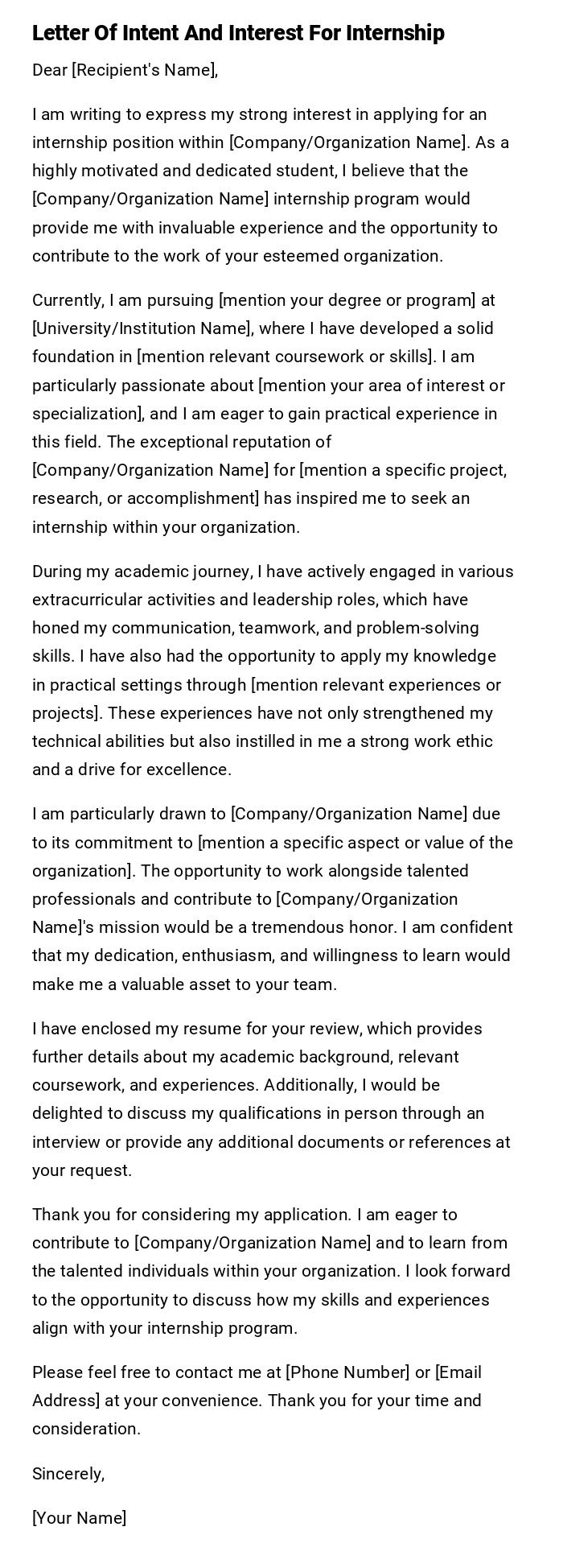
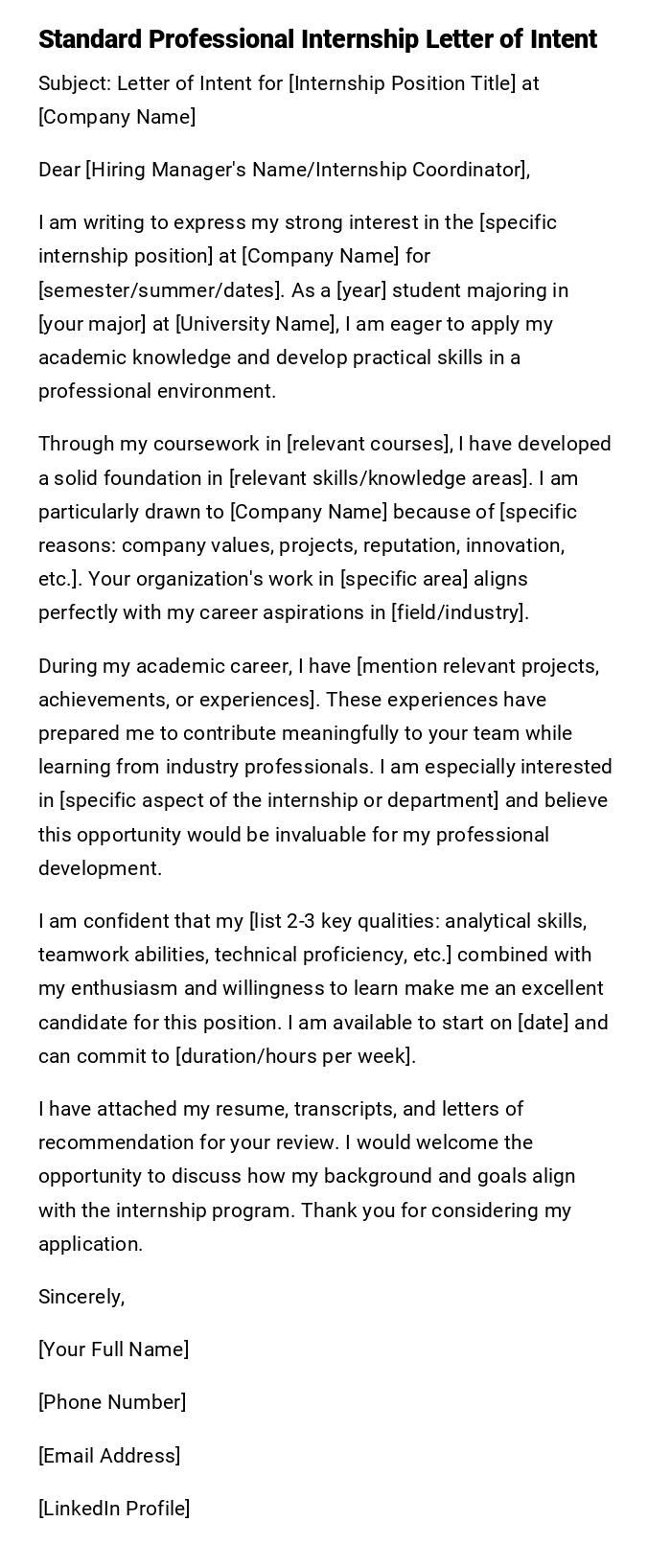
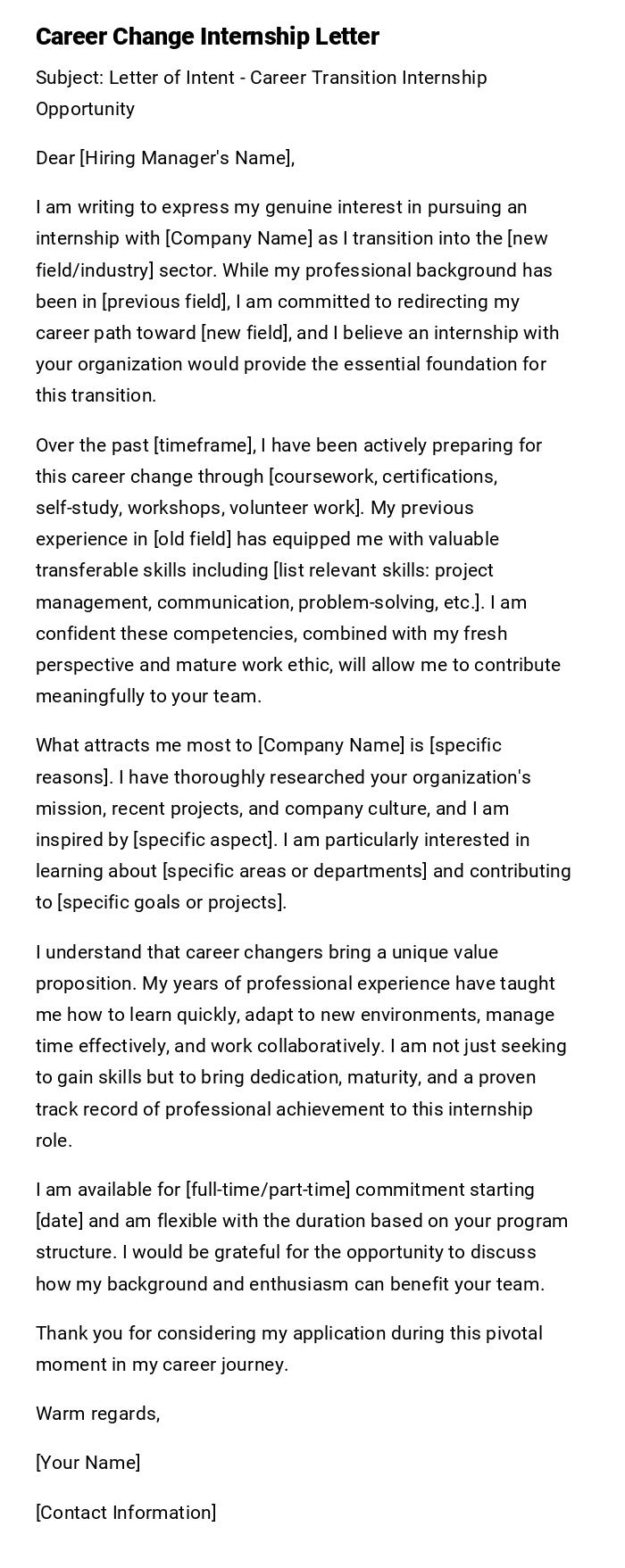
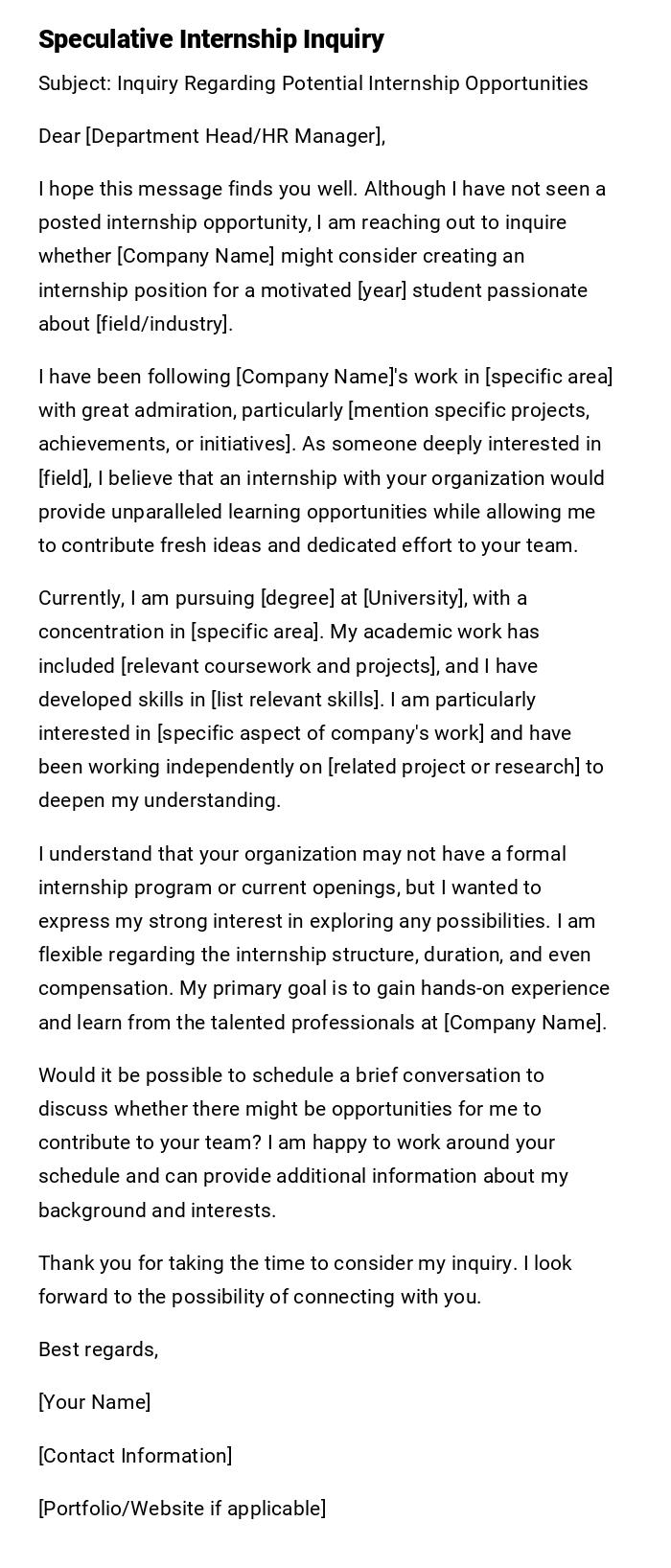
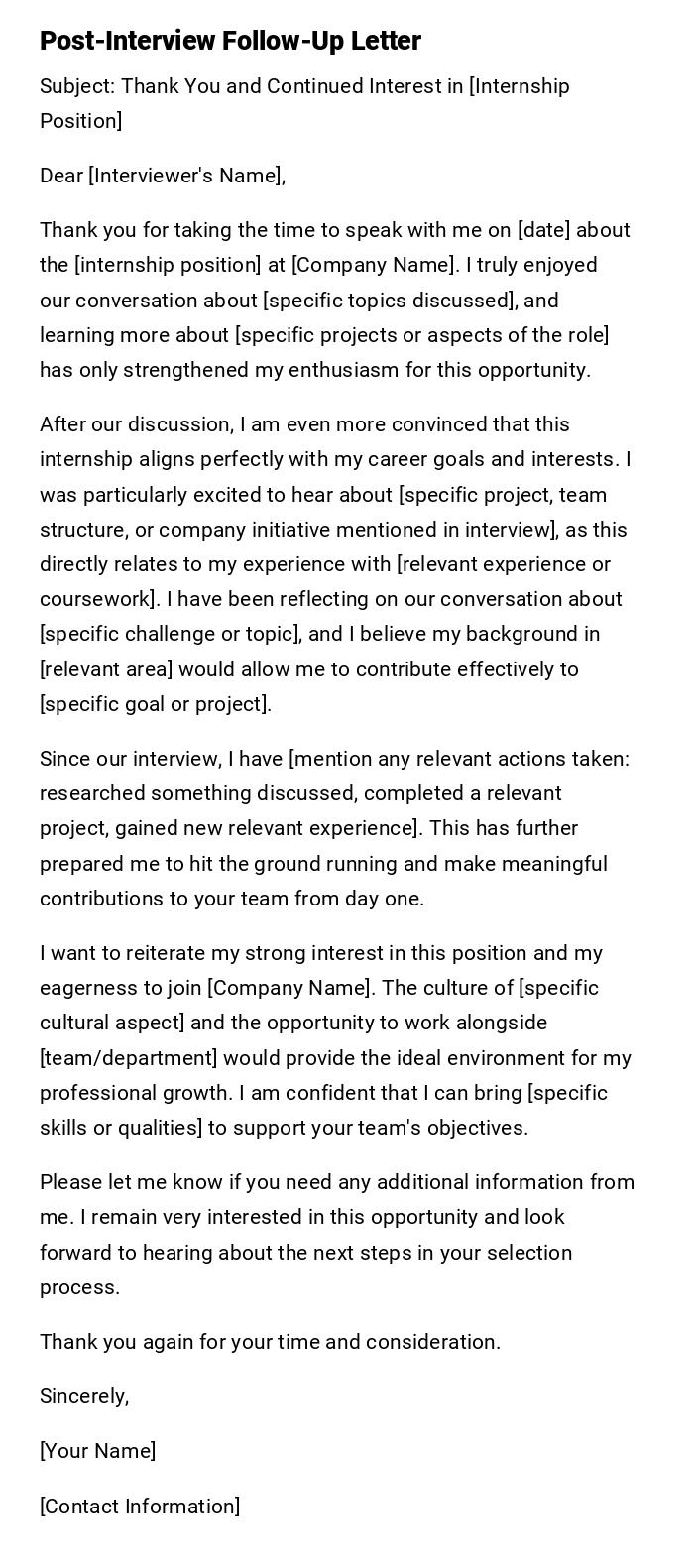
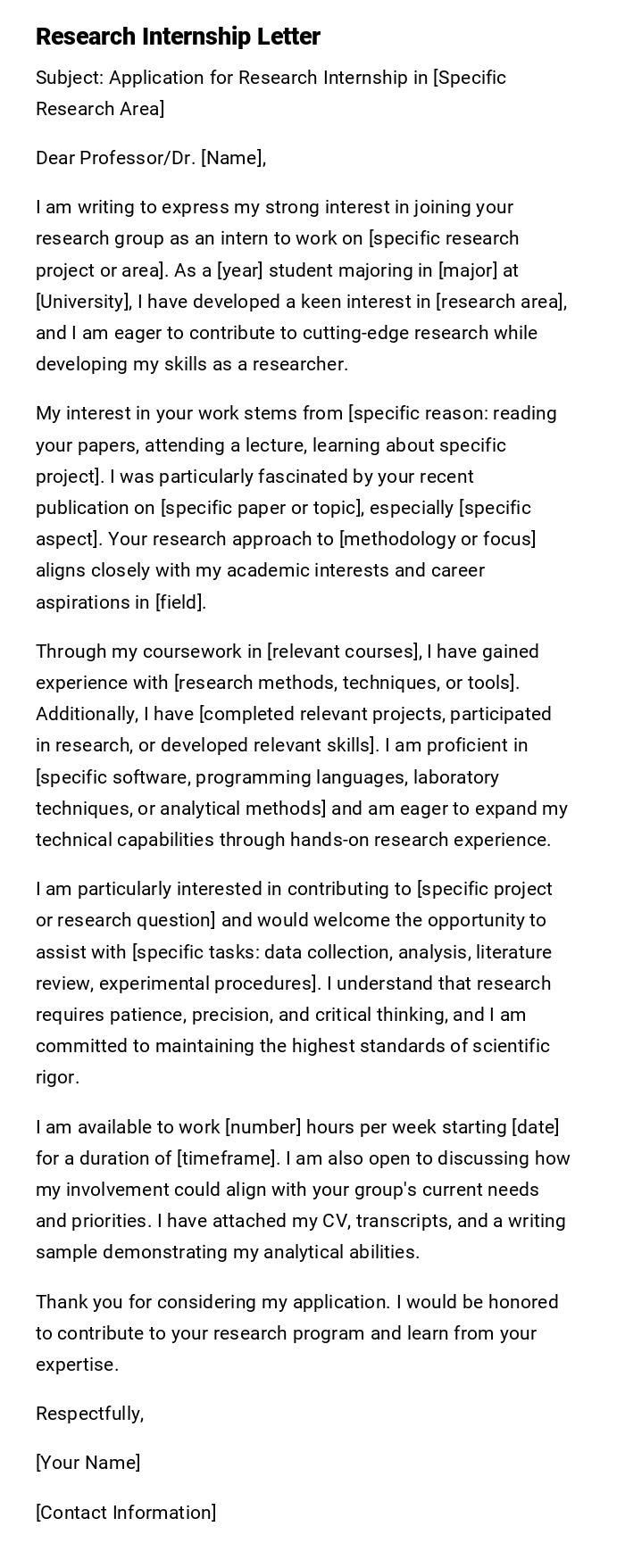
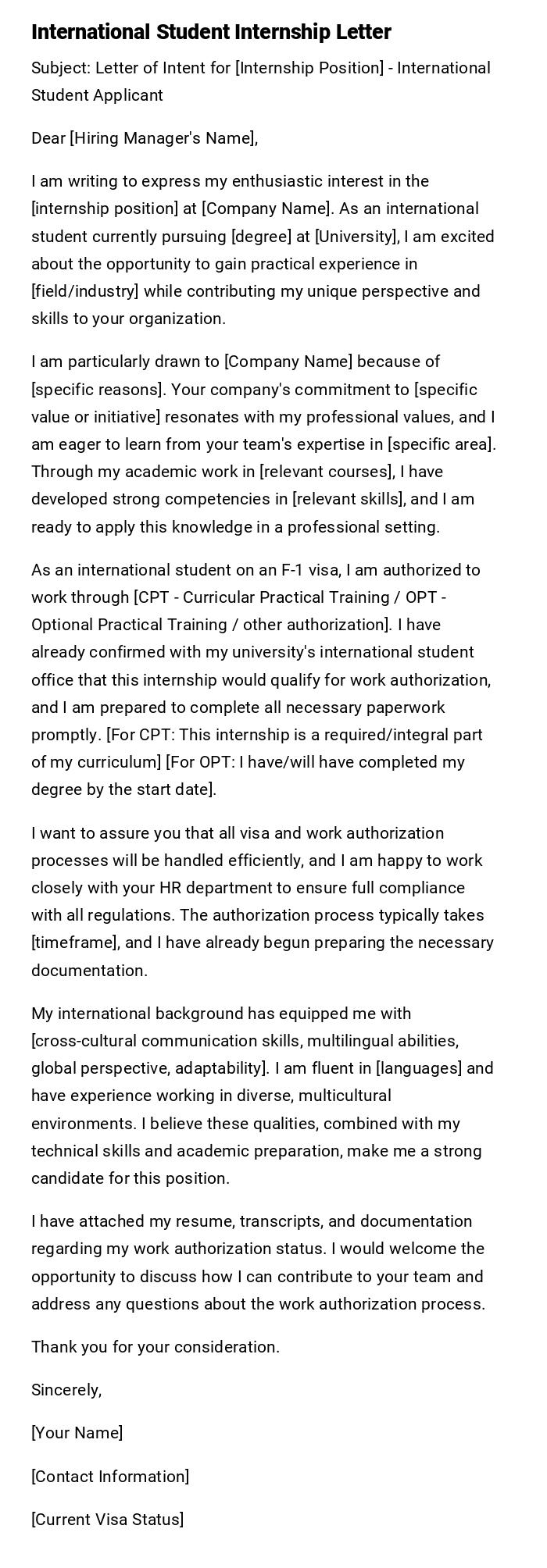
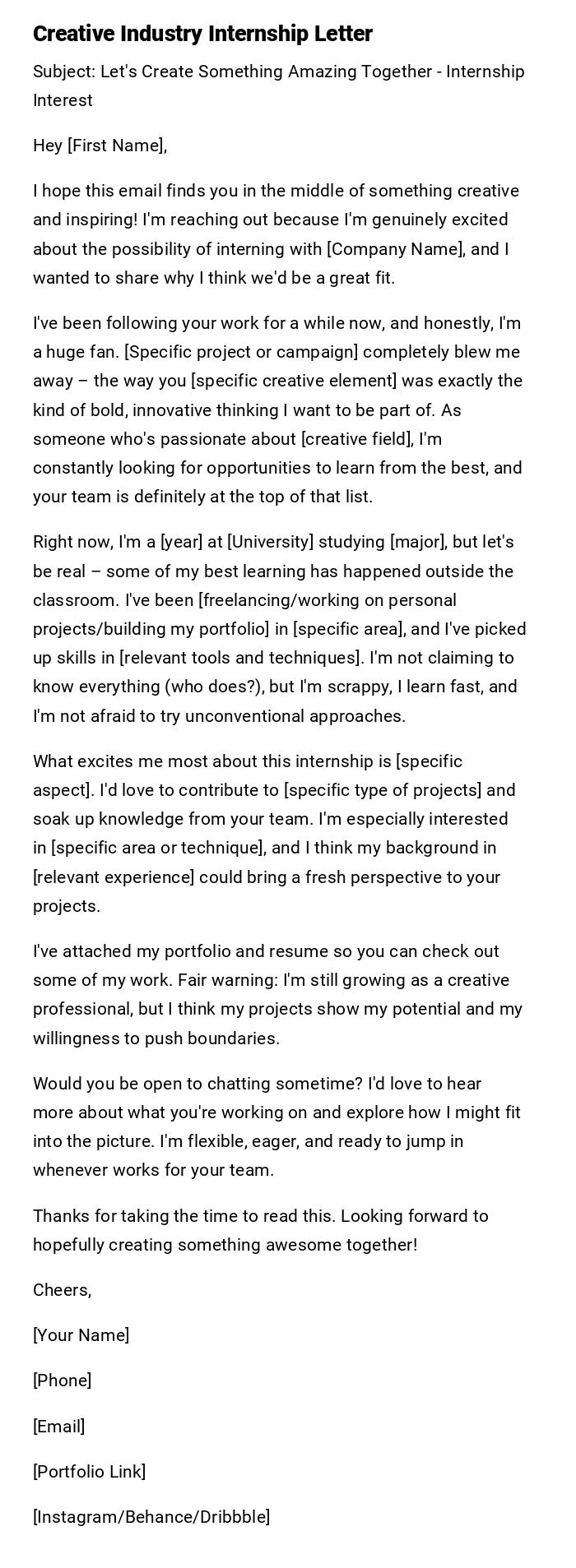
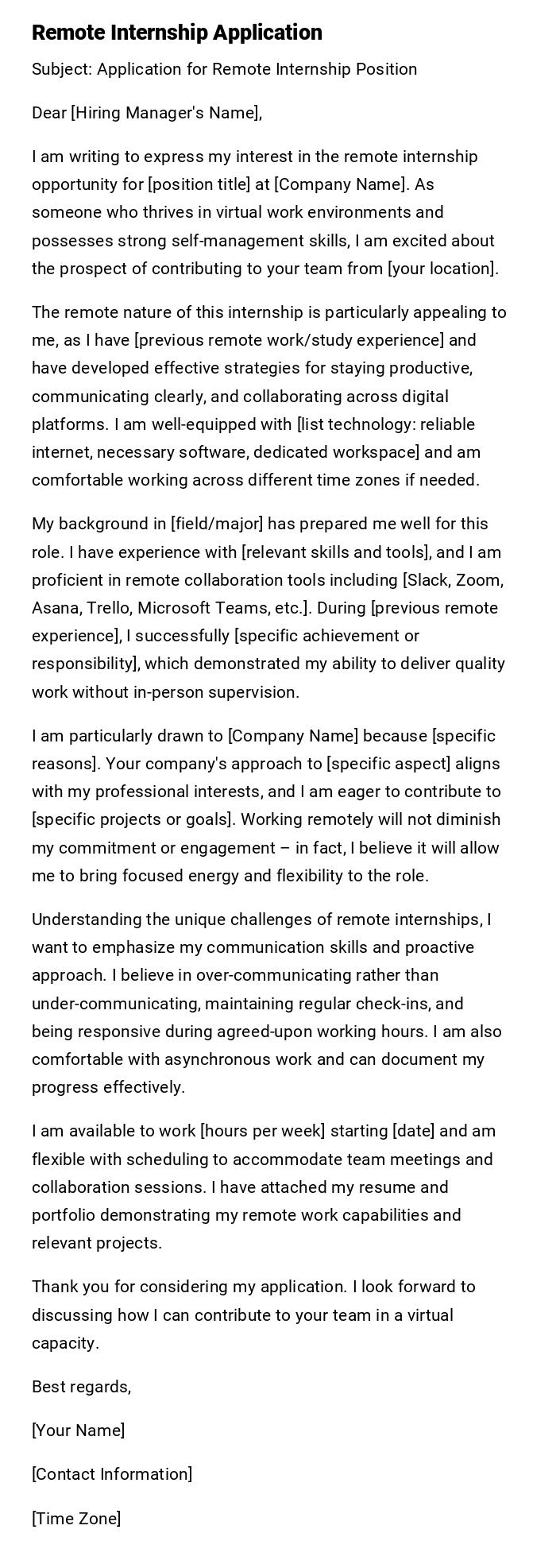

 Download Word Doc
Download Word Doc
 Download PDF
Download PDF